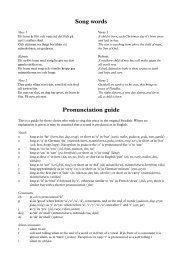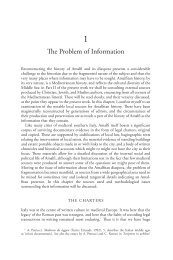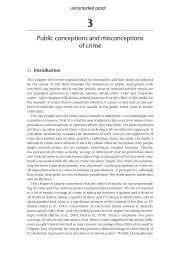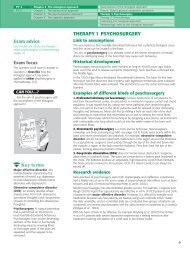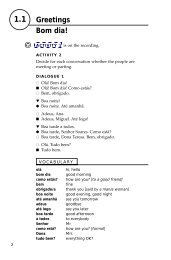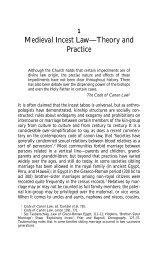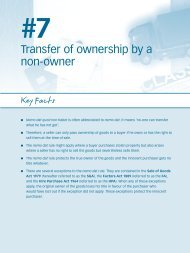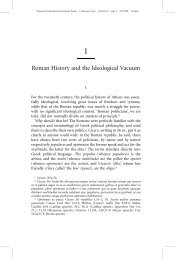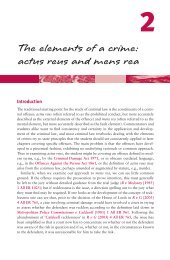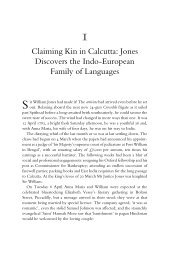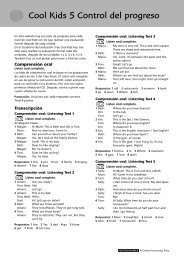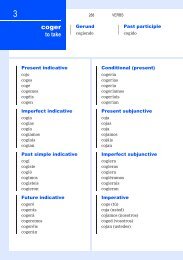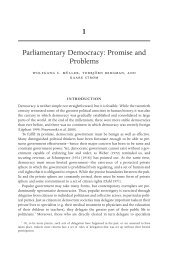Chapter 11 The Tort of Negligence - OED-update - Oxford University ...
Chapter 11 The Tort of Negligence - OED-update - Oxford University ...
Chapter 11 The Tort of Negligence - OED-update - Oxford University ...
You also want an ePaper? Increase the reach of your titles
YUMPU automatically turns print PDFs into web optimized ePapers that Google loves.
<strong>Chapter</strong> <strong>11</strong> <strong>The</strong> <strong>Tort</strong> <strong>of</strong> <strong>Negligence</strong> 375<br />
Decision: <strong>The</strong> defendant was not liable for additional injuries because the claimant had acted<br />
unreasonably, and this constituted a break in the chain <strong>of</strong> causation.<br />
Where an intervening act breaks the chain <strong>of</strong> causation, the defendant will only be liable<br />
for injuries that occurred to the claimant prior to that event. <strong>The</strong> cause <strong>of</strong> the final loss<br />
suffered by the claimant is that intervening event, which if it is the act <strong>of</strong> a third party, may<br />
result in the claimant taking action against the third party.<br />
Basic Terminology<br />
Nervous shock A psychiatric illness or condition<br />
such as post-traumatic stress disorder.<br />
Objective test Judging the defendant by the<br />
capabilities <strong>of</strong> the reasonable person.<br />
Primary victim A person who is under actual<br />
threat <strong>of</strong> bodily harm or reasonably believes<br />
themselves to be so.<br />
Proximity Legal closeness between the claimant<br />
and the defendant at the time <strong>of</strong> the cause <strong>of</strong><br />
complaint. Legal closeness includes personal<br />
relationships between the parties and length <strong>of</strong><br />
time between events.<br />
Pure economic loss Where a claimant’s financial<br />
loss is not connected to his physical injury or<br />
damage to his property.<br />
Res ipsa loquitor (the thing speaks for<br />
itself) <strong>The</strong> evidence clearly suggests that the<br />
Summary<br />
After studying this chapter students should be able to:<br />
defendant must have breached his duty <strong>of</strong> care.<br />
(<strong>The</strong> burden <strong>of</strong> pro<strong>of</strong> is changed so that the<br />
defendant must show that he was not negligent.)<br />
Secondary victim A person who suffers a<br />
psychiatric illness as a result <strong>of</strong> witnessing an<br />
accident or its ‘immediate aftermath’.<br />
Strict liability Liability which is imposed on a<br />
person without having to prove that the person<br />
was negligent or at fault.<br />
Subjective test Judging the defendant by his<br />
own capabilities.<br />
<strong>Tort</strong> A civil wrong for which a remedy, usually<br />
compensation, may be awarded to the wronged<br />
person.<br />
Vicarious liability Liability which arises because<br />
<strong>of</strong> one person’s relationship with another, such as<br />
employer and employee.<br />
Outline the difference between the Law <strong>of</strong> <strong>Tort</strong>s and Contract and Criminal Law<br />
• A tort is a civil wrong and is primarily about providing a remedy for people for harm that they have<br />
suffered. <strong>The</strong> Law <strong>of</strong> <strong>Tort</strong>s concerns involuntary obligations that are imposed upon persons by the law.<br />
• Criminal Law is primarily about punishing the people who have committed wrongs in the eyes <strong>of</strong><br />
the state.<br />
• In the Law <strong>of</strong> Contract, the obligations imposed in the contract have been voluntarily agreed to by<br />
the parties when they entered into the contract.<br />
For an online<br />
flashcard glossary<br />
scan here<br />
or visit the ORC<br />
For an online<br />
printable version<br />
scan here<br />
or visit the ORC




